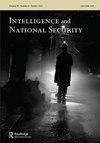The perils of presidential openness: strikes, secrecy and performative opacity
IF 0.8
3区 社会学
Q1 HISTORY
引用次数: 1
Abstract
ABSTRACT In a world of increasing openness, secrecy retains its value. Covert operations, including strikes against individuals, can provide intelligence agencies with the ability to operate strategically, while limiting domestic entanglements and international provocation. But presidents increasingly push the boundaries, retrospectively using their decisions performatively for political advantage. This can confront agencies with a dilemma wherein they are pressed to demonstrate the rationale for a covert mission in ways that undermine future operational security. Evidence from the strikes on Osama bin Laden and Iran’s General Soleimani will be used to argue that retrospective briefs designed to enhance legitimacy or prestige are problematic. Instead, these active disclosures, sometimes by senior figures, can lead to a general unravelling of secrecy which has the potential to threaten future operational credibility and effectiveness.总统公开的危险:罢工、保密和表演不透明
本文章由计算机程序翻译,如有差异,请以英文原文为准。
求助全文
约1分钟内获得全文
求助全文
来源期刊

Intelligence and National Security
Multiple-
CiteScore
1.80
自引率
41.70%
发文量
93
期刊介绍:
Intelligence has never played a more prominent role in international politics than it does now in the early years of the twenty-first century. National intelligence services are larger than ever, and they are more transparent in their activities in the policy making of democratic nations. Intelligence and National Security is widely regarded as the world''s leading scholarly journal focused on the role of intelligence and secretive agencies in international relations. It examines this aspect of national security from a variety of perspectives and academic disciplines, with insightful articles research and written by leading experts based around the globe. Among the topics covered in the journal are: • the historical development of intelligence agencies • representations of intelligence in popular culture • public understandings and expectations related to intelligence • intelligence and ethics • intelligence collection and analysis • covert action and counterintelligence • privacy and intelligence accountability • the outsourcing of intelligence operations • the role of politics in intelligence activities • international intelligence cooperation and burden-sharing • the relationships among intelligence agencies, military organizations, and civilian policy departments. Authors for Intelligence and National Security come from a range of disciplines, including international affairs, history, sociology, political science, law, anthropology, philosophy, medicine, statistics, psychology, bio-sciences, and mathematics. These perspectives are regularly augmented by research submitted from current and former intelligence practitioners in several different nations. Each issue features a rich menu of articles about the uses (and occasional misuses) of intelligence, supplemented from time to time with special forums on current intelligence issues and interviews with leading intelligence officials.
 求助内容:
求助内容: 应助结果提醒方式:
应助结果提醒方式:


